As the only properties without fixed rent on a standard Monopoly board, the two utilities might be an unpredictable portfolio addition.
It’s not easy to determine whether or not the Water Works will be worthwhile. Or whether the Electric Company will add spark to your game.
In this guide, we’ll clarify the Monopoly Utilities rules, and advise whether you should buy them or not.
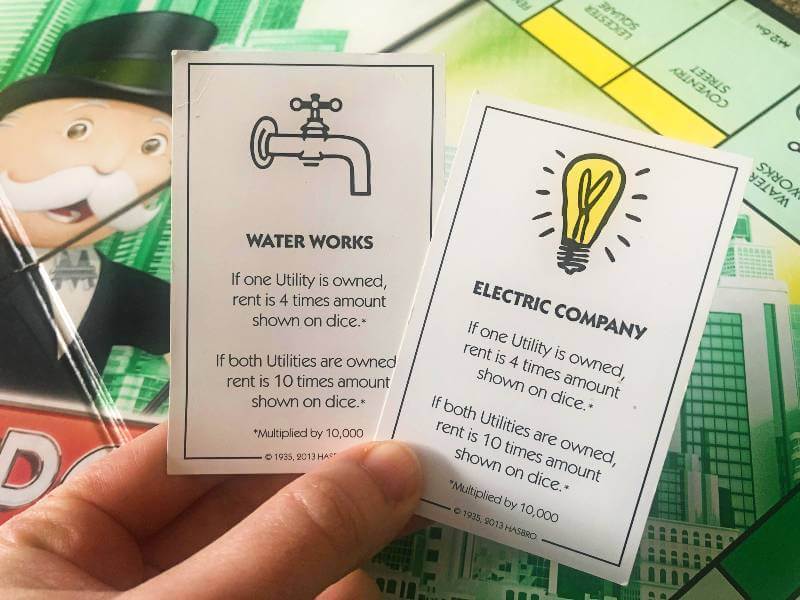
Monopoly Utility Rules
The rules of Utilities are simple, but returns are unpredictable as the rent owed could change every time a player lands on the property.
How do Utilities work in Monopoly?
The Monopoly utilities are the Water Works and Electric Company. Instead of having a fixed rent, the amount a player pays is determined by the dice roll that landed them on the property.
If the holding player owns just one utility, the amount to be paid is four times the amount shown on the dice.
Owning both Water Works and the Electric Company will increase the rent to ten times the number shown on the dice.
| Dice Roll | Rent with one utility | Rent with both utilities |
|---|---|---|
| 2 | $8 | $20 |
| 3 | $12 | $30 |
| 4 | $16 | $40 |
| 5 | $20 | $50 |
| 6 | $24 | $60 |
| 7 | $28 | $70 |
| 8 | $32 | $80 |
| 9 | $36 | $90 |
| 10 | $40 | $100 |
| 11 | $44 | $110 |
| 12 | $48 | $120 |
What is the Electric Company?
The Electric Company is the first of the two utilities in Monopoly. It’s located two spaces after Jail. It has an initial cost of $150 and a mortgage value of $75.
If the player lands on the Electric Company, they’ll pay rent to the value of four times the number shown on the dice. If the holding player also owns the Water Works, they’ll pay ten times the dice value instead.
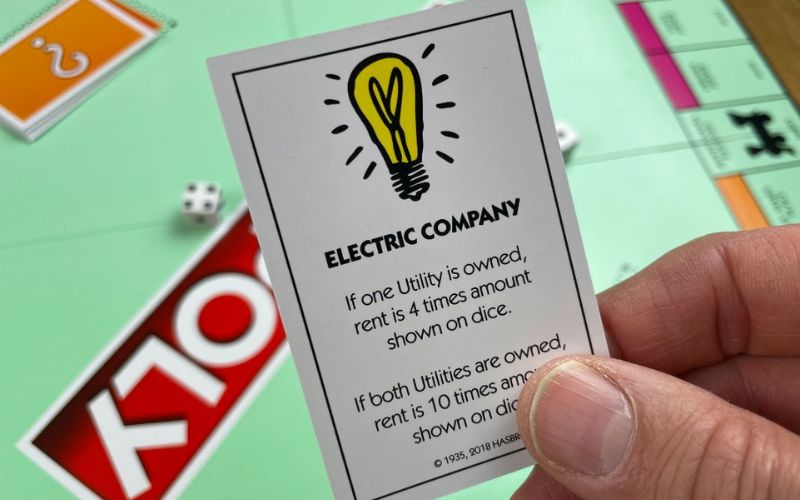
What is Water Works?
Water Works is the second of the Monopoly utilities. It’s located two spaces before the Go to Jail space. Water Works has an initial cost of $150 and a mortgage value of $75.
If the player lands on the Water Works, they’ll pay rent to the value of four times the number shown on the dice. If the holding player also owns the Electric Company, they’ll pay ten times the dice value instead.
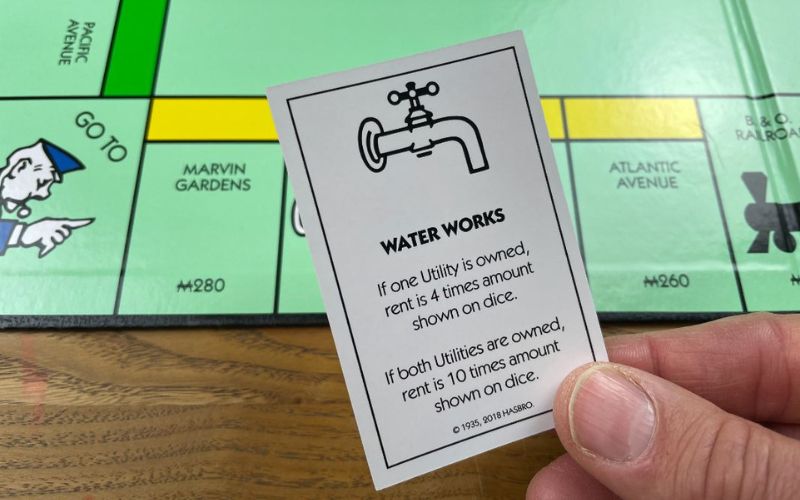
What is the cost of each of the utilities in the game of Monopoly?
Water Works and the Electric Company each cost $150. To purchase both you’d pay $300 in total.
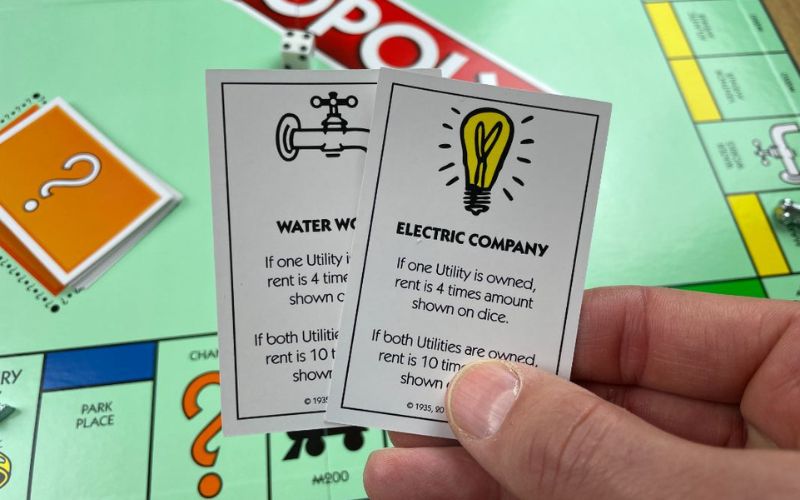
How much is rent on utilities in Monopoly?
If the holding player owns just one utility, rent is charged at four times the value of the dice roll that landed the other player on that Monopoly space. If the holding player owns both utilities, this increases to ten times the value of the dice roll.
Playing Monopoly is a great way to teach kids their four and ten times tables!
In some versions of Monopoly, such as Monopoly Electronic Banking, you will multiply the rent owed by 10,000, which means that you would owe between $80K and $1.2M for landing on the utilities.
Monopoly Utilities Strategy
You can’t add houses or hotels to a Monopoly Utility, so there’s no way to increase the rent you can charge if a player lands on them.
However, they could bring in a lot of money if other players keep rolling high.
To work out if Monopoly utilities are worth it, let’s take a look at the return on investment for Water Works and the Electric company…
Monopoly utilities return on investment
Whether or not buying the Monopoly utilities is worth it will depend on:
- Whether you own one or both utilities – You will earn 2.5X more rent each time if you own both
- How many people are playing – If there are five other players to land on your utilities you will earn more than if only one other player could land on them
- How early in the game you can buy the utilities – Their worth goes down as the game progresses and there are fewer chances to earn rent
As well as the potential for earning, buying the utilities also has the advantage of preventing you from owing rent when you land on them again – something which becomes more important in a two-player game.
How many times does a player have to land on the Monopoly Utilities to get your money back?
If you own a single Monopoly utility, you will earn between $8 and $48 each time another player lands on it, with an average rent of $28.
Therefore, it will take between 3 and 19 landings to make a profit, with an average of 6 landings to make a profit.
If you own both the Water Works and Electric Company, you will earn between $20 and $120 each time another player lands on them, with an average rent of $70.
Therefore, it will take between 3 and 15 landings to make a profit, with an average of 5 landings to make a profit.
Remember that when you have both utilities, you also have double the potential to earn rent.
| Min. landings to break even | Avg. landings to break even | Max. landings to break even | |
|---|---|---|---|
| Single utility | 3.125 | 5.38 | 18.75 |
| Both utilities | 2.5 | 4.29 | 15 |
What is the chance of landing on Water Works or Electric Company in each turn?
On each roll of the dice, a player has a 2.6% chance of landing on the Electric Company, a 2.8% chance of landing on Water Works, and a 5.4% chance of landing on either utility. [Source]

How many turns does it take to get a return on investment from the Monopoly utilities?
In a typical two-player Monopoly game, if you own a single utility, your opponent would need to roll the dice an average of 199 times for you to get a return on your investment.
If you owned both utilities, they would need to roll 79 times for the same to happen.
This is demonstrated in the following table…
| One utility | Both utilities | |
|---|---|---|
| Chance of landing per roll | 2.70% | 5.40% |
| Avg. rolls needed to land | 37.04 | 18.52 |
| Avg. landings to break even | 5.38 | 4.29 |
| Avg. rolls needed for ROI | 199 | 79 |
In a typical four-player Monopoly game, if you own a single utility, your opponents would each need to roll the dice an average of 66 times for you to get a return on your investment.
If you owned both utilities, they would need to roll 22 times each for the same to happen.
Of course, it could take many more or fewer rolls, depending on whether your opponents roll high or low numbers when they land on your property.
It’s difficult to know how many turns each player takes in an average game of Monopoly and this depends on how many people are playing and which rules are being used.
Estimates of the average number of turns in a game of Monopoly fall between 30 and 100 rolls per player.
Another thing to consider is that you might not have to pay the full price for Electric Company or Water Works if you can pick them up cheaper in an auction or as part of a trade.
Are utilities good in Monopoly?
In Monopoly, Water Works and Electric Company aren’t great to buy as your opponents will need to land on them about five or six times before you make your money back. If you can get the utilities for less than the $150 asking price early in the game then they may generate a decent enough return on investment to be worth it.
Which is best – Water Works or Electric Company?
A Monopoly probability study found that players have a higher chance of landing on the Electric Company than on the Water Works. However, the difference was small (2.8% compared to 2.6%).
The utilities both follow the same rules, so once you’ve landed on one of these properties the price you pay will depend entirely on the value of your dice roll. This means that it’s marginally better to buy the Electric Company.
However, the Monopoly utilities aren’t that valuable on their own. If you only own one utility property, the highest possible rent you’ll receive is $48. If you own both properties, you could earn as much as $120 each time.
As stand-alone properties, the utilities aren’t very useful. If you’re going to buy one, you really need to plan to own the other utility as well.
Alternative Monopoly Utilities Rules
Over the years, people have made up many alternative rules to Monopoly (known as house rules) and some of these involve Water Works and the Electric Company.
Following an alternative set of rules, the utility properties may behave differently.
If you want to spice up your next game, let’s take a look at some of the alternative rules for the Electric Company and Water Works…
1. Six Railroads Rule
In this version of the Monopoly rules, the Water Works and Electric Company act as the 5th and 6th railroads.
The purchase price rises to $200, in line with the other railroads. They can be mortgaged for $100.
If you’re playing by the Six Railroads rules, the rent charges are:
- $25 when one railroad is owned
- $50 when two railroads are owned
- $100 when three railroads are owned
- $200 when four railroads are owned
- $300 when five railroads are owned
- $400 when six railroads are owned
Alternatively, you may also decide that the fifth railroad is worth $400 and the sixth is worth $800. The fifth and sixth railroads are extremely valuable properties to have if you’re playing by these rules.
If a player receives an ‘Advance to Nearest Utility’ card, then they can instead advance to the nearest railroad. Alternatively, these cards can be removed from the deck before play.
2. Utilities in Monopoly Mega Edition
In Monopoly Mega Edition, a third utility is added. In this version of the game, the Gas Company is the third utility.
If all three utilities are owned, rent is charged at twenty times the value of the dice roll.
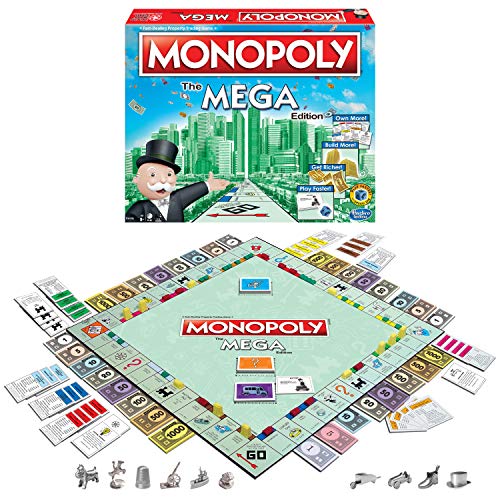
3. Utilities in Monopoly Revolution
In Monopoly Revolution, there are four utility companies. These are Electric Company, Gas Company, Water Works and Communications Company.
In this game, rent doesn’t depend on the dice roll – it’s charged at a set amount depending on how many utilities are owned.
In Monopoly Revolution, the utilities cost $1.5M each and will pay out between $200K and $1.5M, depending on how many are owned.
Monopoly Revolution utility rents:
- One utility – Rent is $200K
- Two utilities – Rent is $400K
- Three utilities – Rent us $800K
- Four utilities – Rent is $1.5M

The Bottom Line
The purchase of a single utility property is rarely a worthwhile investment in the game of Monopoly.
However, once you’re the owner of one utility, it’s sensible to purchase the other. It can also be worth buying the remaining utility to block another player from owning both.
Monopoly utilities will never be the most valuable spaces on the board, but they could help you earn some extra money as a form of passive income during play. Once you’ve bought these properties, they’re an easy source of cash for the rest of the game.

